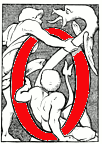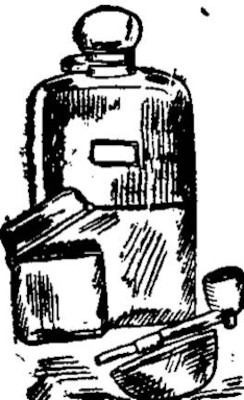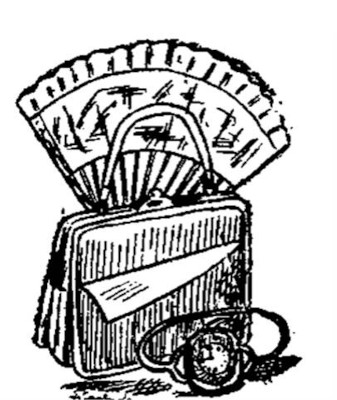This article has been transcribed from a copy of the Cardiff Times in the online collection of scanned Welsh newspapers 1804-1919 in the National Library of Wales, with grateful recognition of the free access accorded to all readers.
'Enterprises of great pith and moment' comes from Hamlet III.i.88. The caption to the second illustration may tempt one to look for a bilingual pun, but none has been found. —— David Skilton

ne of the most curious, yet at the same time one of the most important parts of the human organisation is fancy. It is doubtful, I suppose, whether it can be defined any more than Mind or Memory can; yet it is part and parcel of men and women, and has played sad havoc with the lives of more than one of them this ere this.
It is always with us, and plays its part in our lives day by day. We may change our habits, or change our names; we may remain at home or go abroad; yet
'Fancy, like the finger of a clock,
Runs the great circuit and is still at home.'
[William Cowper, The Task (1785), Book IV, l. 118.]
You cannot get rid of it, and young and old, rich and poor, are alike the victims of its caprice. Fancy has, ere this, made and marred the career of talented and popular men, and in not a few cases ruin has fallen upon the most brilliant members of society as the result of a fancy for a fair but capricious daughter of Eve.

A painter'sfancy.
Who does not know the wretched story of a deserted wife, neglected children, and a divorce trial which have so often resulted from a fancy of this nature? Few indeed, I ween.
But leaving the unpleasant domestic results accruing from fancies feminine, let us see how fancy acts upon the every-day life of men and women.
I think there is little to choose between men and women in the matter of fancy, for the former have qui[te] as many fancies as the letter.
Some men have a special fancy in the direction of curious pipes, and indulge their weakness to such an extent that they in time become possessed of more pipes than they could smoke if they changed them every day, a thing hardly likely to occur with a smoker, who, in whatever direction his fancy may take him in the way of curiosities, is pretty certain to have a fancy for one special pipe which he would rather smoke than any other in his collection, and, as likely as not it is a very ordinary clay. You see he fancies it, and such a strong power is fancy that you could not induce him to change it for the most expensive pipe you could present to him.

Yn-fancy.
Without for a moment going so far as to express[s] any belief in what has of late become known as 'faith-healing,' I am certain, and my ideas are carried out by medical experience, that fancy is a great and wonderful factor in cases of illness.,
So far does fancy rule an indisposed person that it depends upon that power whether the medical man in attendance has a fair chance given to him and his remedies by the patient.
Once let a patient say of his doctor 'I don't fancy he is treating me properly,' it is at once an assured fact that the medical man is going to have much trouble with the patient whose own fancy will for a certainty retard his chances of recovery. In such a case the wisest plan is to change the doctor at once.

A gentleman's fancy.
The most objectionable form of sick-bed fancy. one which gives more trouble to doctors than tangible symptoms, is that which induces the patient to imagine he or she is not going to get better. Not unfrequently such a fancy induces a state of melancholia which has ere this so defied the treatment of the best doctors that the patient died, and died, if the truth were told, from the results of a morbid fancy.
Patients not given to fancy at all, but who take things as they are, stand a far better chance of recovery than do those who let fancy rule the roast to the exclusion of science and common sense. Fancy at its best is to be found in the labours and productions of the poets and the painters.
Yet by a curious phase of paradox their fancies are perhaps the only ones which do not run riot in the mind untrammelled. Their fancies are sought for, and when they come, they come in some form which has at once the surroundings of training and restraint. They are not fancier which come we know not how, and which compel us to give rein to their caprice without thought to the good or evil they may bring in their train. No. they are moulded and formed almost ere they exist, as it were. Yet they are fancies.

A lady's fancy.
Strange as it may seem there is a direct fancy line of connection in the matter of the producer of pictures and the purchaser, more especially if the latter be a person more blessed with wealth than knowledge. In his visits to studios and galleries such a buyer is guided entirely by fancy, and his collection of paintings teach [sic] a lesson in fancy which many would do well to learn if they desire to avoid the inartistic errors produced at intervals by fancy. It does not matter to this stamp of collector whether a picture has any artistic or technical merit if he but takes a fancy to it, and all attempts at criticism fall to the ground when he tells you that he does not doubt the truth of your remarks, but he fancies the pictures and does not care about their value as works of art so long as they please him. If hats and bonnets may be considered, as their makers claim for them, works of art, fancy does indeed play a great part in art, for there is nothing in the world so subject to fancy as the head-gear of the maids and matrons of this our Isle of England.
A girl buys a hat or a bonnet, for which she pays a price which represents about four or five times its intrinsic value, and she has perhaps not worn it more than a week before she discovers that she does not fancy it. There may be more reasons than meet the eye for this kind of fancy, and a change in the fashions or the sight of novelty on the head of a rival or friend may and does account for many fancies and changes in the matter of feminine head-gear. As each fancy crops up the head-gear is altered, and as a consequence the original disappears, and in its place is periodically to be found a new-fangled fancy.
Whatever the actual and precise cause of fancy may be, it is both interesting and instructive to note its effect upon life and living, and if it could be tested to the full, it would be found that 'Enterprises of great pith and moment'[i] have, ere this, been the outcome of fancy.
Links to Related Material
Last modified 19 April 2022